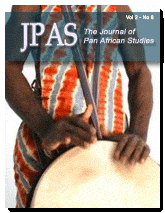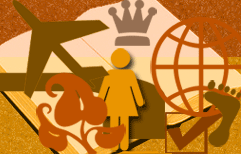ARCHIVE ISSUE
 Volume 2 • Number 8 • 2009
Volume 2 • Number 8 • 2009
● Kiswahili: The Mother Tongue
by Itibari M. Zulu
[ view PDF ]
● The Role of Kiswahili in the Integration of East Africa
by John Habwe
[ view PDF ]
This paper investigates the role of Kiswahili in the integration of the diverse communities of East Africa and argues that it faces great challenges by the globalization of other languages.
● The Case for Kiswahili as a Regional Broadcasting Language in East Africa
by Vincent Kawoya and J.S. Makokha
[ view PDF ]
This paper suggest that Kiswahili should be elevated to the position of a regional broadcasting language for a proposed regional broadcasting network operating under the aegis of the East African Community in Arusha, Tanzania.
● Islam and the Development of Kiswahili
by Mwenda Mukuthuria
[ view PDF ]
This paper contends that the role of Islam in the development of Kiswahili has not been given much coverage, therefore this work intends to highlight how historical interaction between the Swahili people and Islam contributed to the expansion of Kiswahili.
● The Adaptation of Swahili Loanwords from Arabic: A Constraint-Based Analysis
by Leonard Chacha Mwita
[ view PDF ]
This paper shows the processes that loanwords undergo when they are adapted from Arabic into Kiwahili, using a linguistic model to show that Kiswahili mainly uses vowel epenthesis to repair syllables and that other procedures like consonant deletion, cluster tolerance and feature change are also represented.
● Understanding Kiswahili Vowels
by Susan Choge
[ view PDF ]
Considering that Kiswahili is a language that share the same phonemes but use them differently to perform a variety of language specific linguistic functions, this paper seeks to discuss and analyze the nature and functions of Kiswahili vowels.
● Discourse on Semiotic and Functional Perspectives of Narratology
by Naomi Shitemi
[ view PDF ]
This paper dialogues narratology from semiotic and functional perspectives focused on creativity and innovativeness within the information industry for marketing needs associated with oral literature in the context of commercial advertisement and political discourse.
● The Pragmatics of Kiswahili Literary Political Discourse
by Florence N. Indede
[ view PDF ]
This discussion attempts a pragmatics analysis of Kiswahili literary political discourse, and suggests that it is not easy to construct meanings from ambiguities realised in the texts or from contexts that are constructs from writer knowledge, beliefs, experiences and assumptions.
● The Effects of 'Sheng' in the Teaching of Kiswahili in Kenyan Schools
by Clara Momanyi
[ view PDF ]
This paper discusses the effects of 'Sheng' in the educational institutions of Kenya via a general overview of its development at the expense of Kiswahili and English, and recommends that specific research need to be done on the language situation in Kenya considering the spread of 'Sheng' and its impact on education.
● The Role of Kiswahili in Enhancing the Potential of Science and Technology
by and Isaac Ipara and Bob Mbori
[ view PDF ]
This paper seeks to provide answers to questions about the centrality of language as a medium of creating, transmitting and disseminating knowledge in science and technology with specific reference to English and Kiswahili usage in Kenya.
● Actualizing Free Primary Education in Kenya for Sustainable Development
by Mbatha Mathooko
[ view PDF ]
This paper discusses free primary education in Kenya in relationship to human rights and Kiswahili as a language of instruction.



